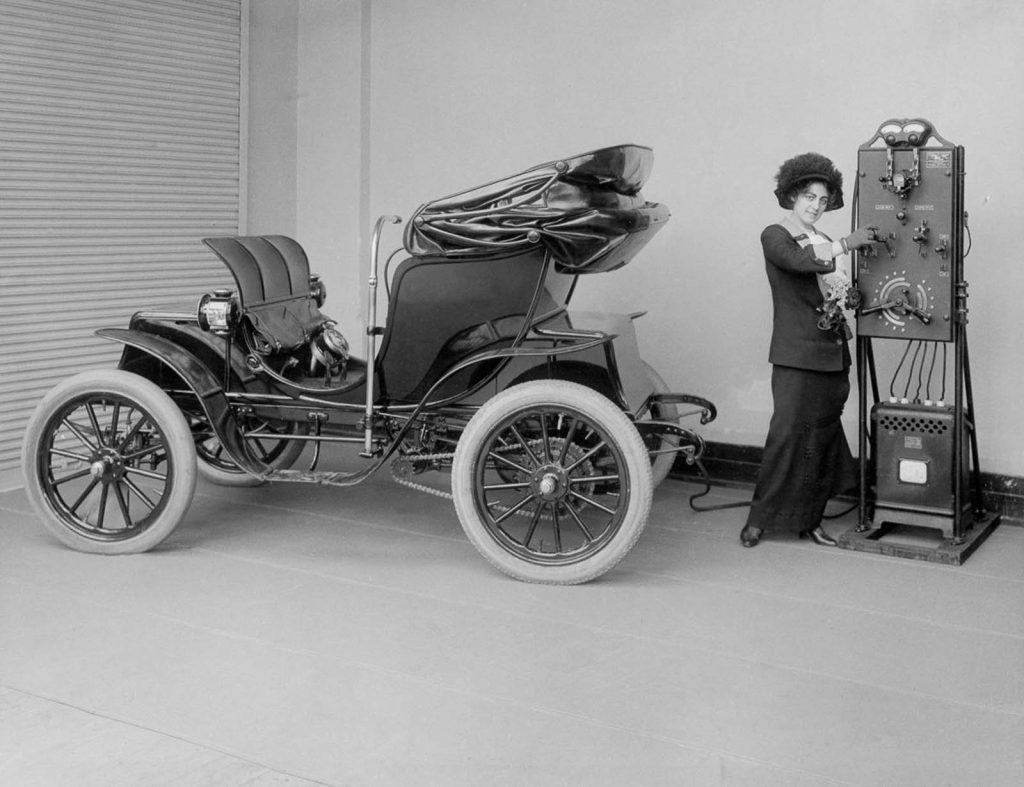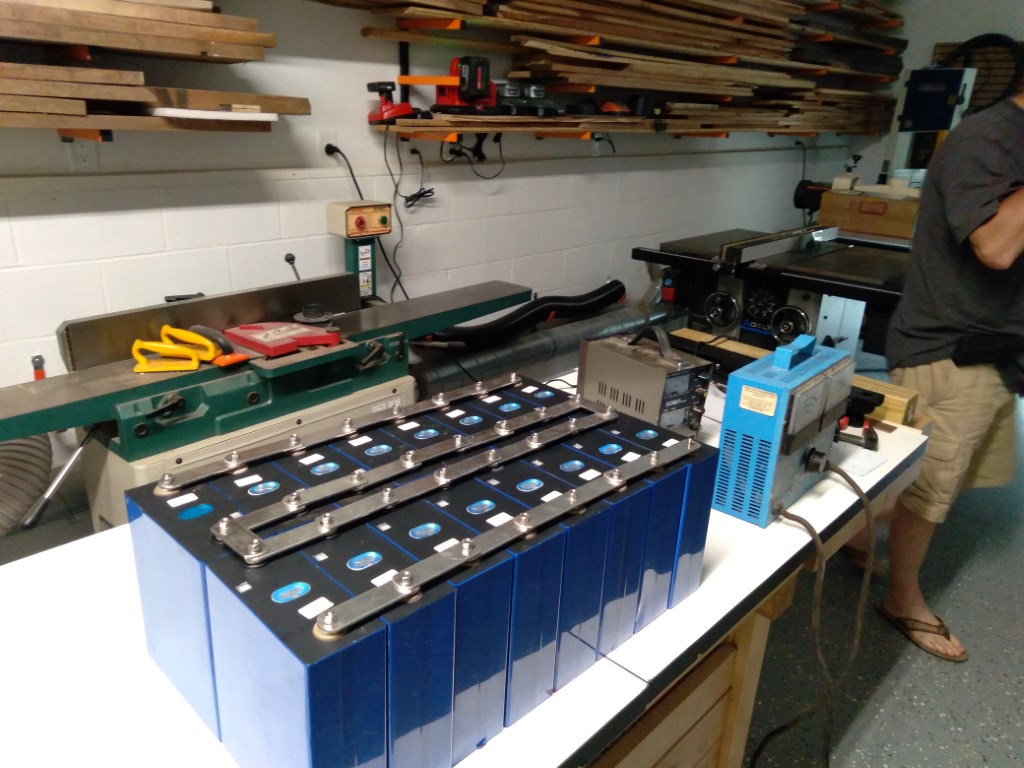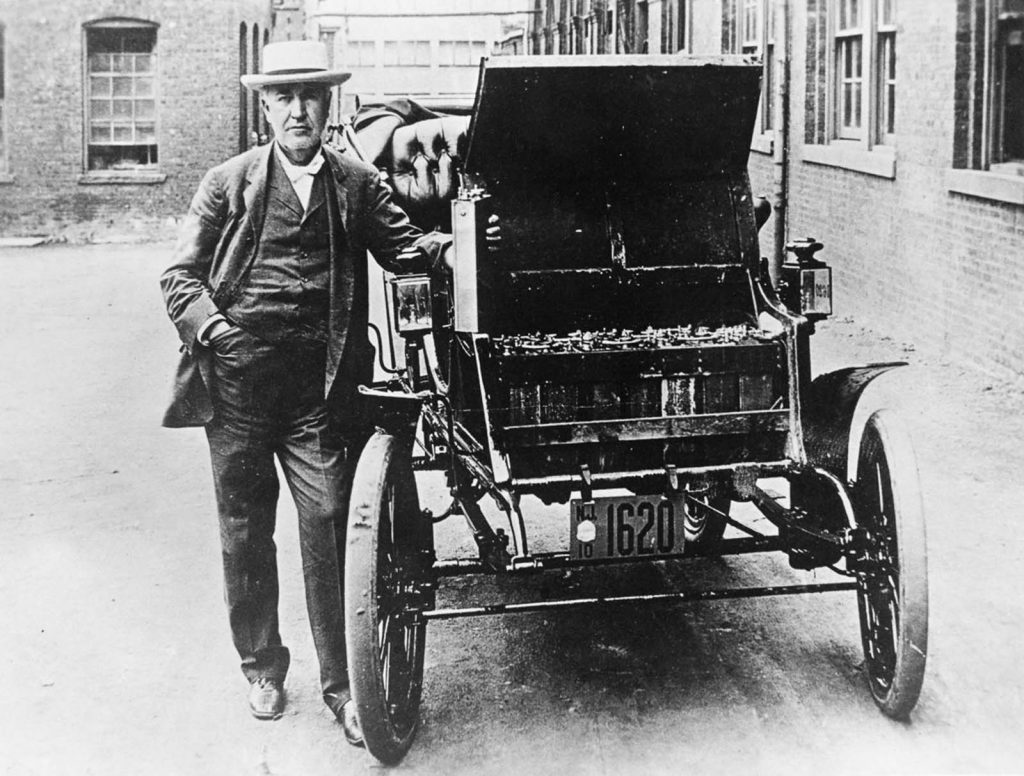A reader wants to know if I have any knowledge of Nickel-Iron or NiFe batteries. See? I read the comments. I just don’t let them post because not everybody is nice or on topic. Anyway, let’s just say I’d love to have a trailer load of NiFe batteries, aka Edison batteries.
Thomas Edison was a childhood hero of mine, until I learned what a jerk he was. Still, you have to be impressed by all the inventions he and his team cranked out. One of these inventions was the Edison battery. The late 1800s had all kinds of batteries, but the automobile was promising to be the next big thing and there just wasn’t a suitable battery on the market. (I still feel that way.) Edison teamed up with Detroit Electric to come up with a practical electric car.
The result was the Nickel-Iron (NFP) battery. I discovered the NFP back in the 70s, reading Michael Hackleman and other alt energy pioneers. There were stories of finding old NFP cells on abandoned farm installations, rinsing them out, refilling with water and dumping in some Red Devil Lye, with the batteries returning to life. I have heard stories of people gathering up old NFP forklift batteries or railway signal batteries and they were still fine after nearly 100 years. What’s not to love with a battery like that?
Here are some characteristics. The electrolyte is water and lye. No acid or toxic lead. It won’t burn holes in your pants. It won’t make your terminals corrode. They are relatively light weight. They pretty much last forever. Great, huh? On the other hand, they use a fair amount of water. (a special Edison oil was developed to minimize the evaporation) And there is a fair amount of self discharge, but not enough to worry you in a solar power system. The thing is, if you make batteries and a warehouse just keeps on replacing worn out fork trucks while using the same set of batteries, how’re you going to make money? So Exide quit making them.
For a while, eastern Europe is where you had to go for them. Then China. Then a company in the USA started selling refurbs and now Iron Edison makes and sells them in the USA. The USA batteries aren’t cheap. I would even question whether or not they are even cost effective, except that they last forever. If you are in your 20s, that could be a good deal. I am getting to the age where I don’t even buy my tomatoes a little green, so I am not sure I am ready to switch over.

However, if I had unlimited play budget, how would I go with batteries? What’s the comparison?
In my own system, I think I would abandon lead-acid and go with pocket plate Nickel Cadmium, Lithium Iron Phosphate or Nickel-Iron. NiCads got a bad rep with the kinds used in power tools. They would develop a memory a pretty soon would not hold a charge. Pocket plate NiCads don’t do that and are pretty tolerant of heavy charges and discharges. I don’t know where you can find them, except China. Importing from China is always interesting and educational.

LiFePO4 or LFP batteries do not have the energy density of the Lithium Ion batteries used in cars, but they don’t burst into flames quite as easily as the LI batteries. They are smaller and lighter than lead batteries. Unlike lead acid batteries, which don’t like being discharged below 50%, you can repeatedly go down to 20% with LFP batteries, letting you use 80% of the power stashed away and still get perhaps 6000 cycles of use. Furthermore, they aren’t really very fussy about never getting fully recharged. My Zero Export Grid Tie (ZEGT) is a perfect application for LFP batteries. All is not skittles and beer, however. Lithium batteries of any flavor can be very fussy about discharging too much or overcharging. That’s why they come (or should) with a Battery Management System (BMS) to handle the details. Prices are coming down.
Then there is the NiFe. If you overcharge, you just have to add more water. You can discharge them to zero and leave them for 10 years and still bring them back to life. An axe might hurt them, but pretty much anything you do in normal operation won’t. They, like the NiCad and LFP batteries will require different settings on the charge controllers and some inverter/chargers.

These are all good choices for today. Hardly a week goes by that I don’t hear of some new battery chemistry coming out, but getting these things to market is slow. Solar, EV and utility use is really driving battery development. The holy grail of batteries will be cheap, fast charging, large capacity, well-mannered and long-lived. They’re working on it, but I’m not holding my breath. I’m also not changing out my lead-acid batteries until I have squeezed out that last kilowatt-hour of the ones I have.
–Neal

Neal, I spent 5 years pondering batteries for my off-grid solar system. I was enamored with Ni-Fe batteries for all the reasons you mentioned in your blog. I didn’t make my decision NOT to buy them until I met a fellow who had assembled a fairly large solar system using Ni-Fe batteries about 2 months previously. I asked about maintenance. He mentioned using about 60 gallons of distilled water, already. Wow! He added that he was planning on setting up a water still…. I waited until I found a good deal (at the time) on LiFePo4 batteries and didn’t look back. I commissioned my system last December and the only time I unlock my solar shed is when somebody is interested in looking at it. Did I mention I hate maintenance?
– another old fart who has harnessed the sun.
Yes, NiFe batteries can use a lot of water, as can lead acid. I suspect this fellow was charging them too hard, a common issue. With the NiFe battery, overcharging just uses water and doesn’t seem to hurt anything. Regardless of chemistry, check the specs on how fast the battery can safely charge or discharge.